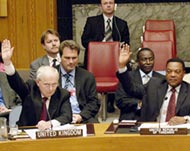Sudan: No Darfur access for ICC
The prosecutor of the new International Criminal Court has said he is investigating killings, mass rapes and other atrocities in western Sudan but can only interview witnesses outside of lawless Darfur.

Luis Moreno Ocampo, an Argentine who was asked by the UN Security Council in March to prosecute those responsible for atrocities in Darfur, also told the council that the Sudanese government had been cooperating with him.
But Sudan‘s Justice Minister, Muhammad al-Mardi told Reuters in an interview that Moreno Ocampo’s investigators would not have any access to Darfur, where ethnic cleansing has resulted in killings, rape and the uprooting of two million refugees.
He said: “The ICC officials have no jurisdiction inside the Sudan or with regards to Sudanese citizens. They cannot investigate anything on Darfur“.
Moreno Ocampo, as well as the current Security Council president, British Ambassador Emyr Jones Parry, said such an official notice had not been received from Khartoum.
Jones Perry said “we will judge the government of Sudan by its actions”, adding that if Sudan did not cooperate, “We will need to respond to that and we will respond to that”.
Witnesses interviewed
Moreno Ocampo said he had “screened” 100 potential witnesses outside Sudan in 17 countries, and was in the process of interviewing them.
Moreno Ocampo said he hoped to visit Sudan‘s special court and other judicial bodies investigating Darfur crimes early next year.
 |
|
Jones Parry (L): UN will respond |
Under the 1998 Rome statutes setting up the Hague-based International Criminal Court, the prosecutor can only conduct investigations when national courts are unable or unwilling to do so.
But in an 85-page report over the weekend, the New York-based Human Rights Watch said not one mid- or high-level government official, military commander or militia leader had been suspended or prosecuted by Sudanese courts.
Jones Parry said the prosecutor told the council in a private session: “The nature of the attacks in Darfur demonstrated a degree of coordination and a degree of a strategic operation which implied that someone was in command and control of that operation.
“His intention is to ascertain who it was and hold them responsible.”
Cooperation accord
Moreno Ocampo also told the council that the International Criminal Court and the African Union, which has troops in Darfur, had drawn up a cooperation agreement in May, which still was not signed. He refused to say why.
|
“The ICC officials have no jurisdiction inside the Sudan or with regards to Sudanese citizens. They cannot investigate anything on Darfur“ Muhammad al-Mardi, |
The International Criminal Court is the first permanent global war crimes tribunal, envisioned after the Nuremberg trials at the end of the second world war.
It was set up to try individuals for genocide, war crimes and crimes against humanity committed after 1 July 2002.
The US vehemently opposes the tribunal, arguing that it could initiate politically motivated prosecutions of American troops and officials abroad. But it allowed the council last March to refer Darfur to the International Criminal Court by abstaining.
One hundred countries have ratified the 1998 Rome Treaty that established the court and believe it contains enough safeguards to prevent frivolous prosecutions.